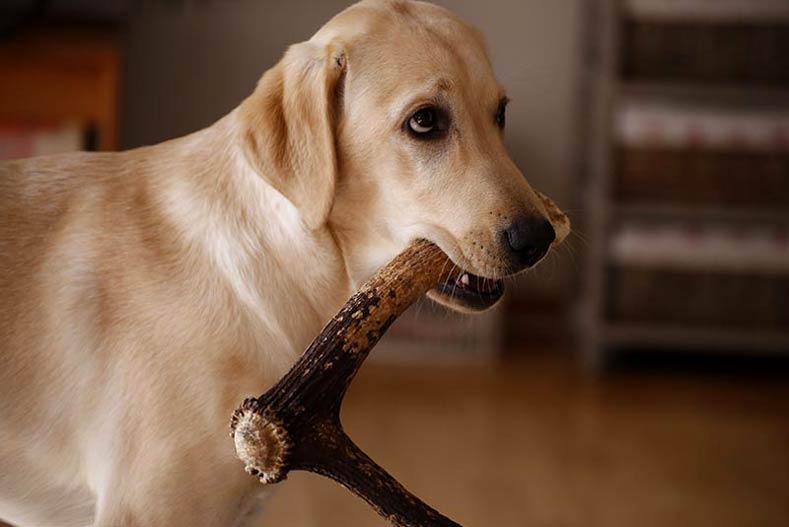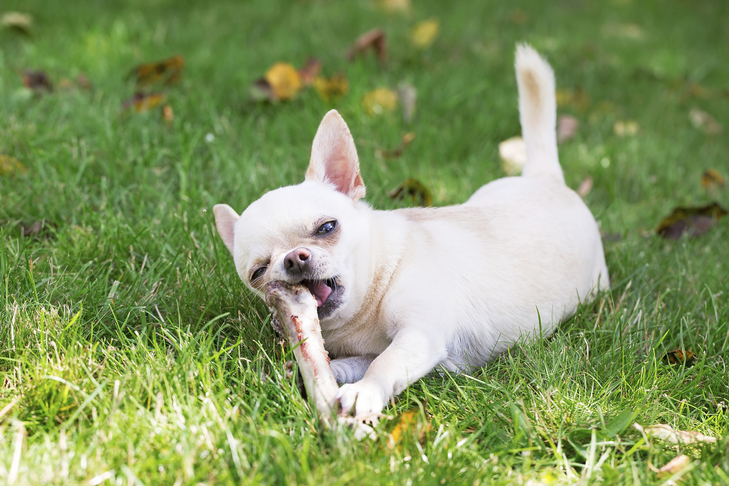
AKC is a participant in affiliate advertising programs designed to provide a means for sites to earn advertising fees by advertising and linking to akc.org. If you purchase a product through this article, we may receive a portion of the sale.
Dogs love chewing on bones and antlers. This fact is reinforced in cartoons, the media, advertising, and even in our speech. But are antlers for dogs safe to chew?
On the surface, antlers for dogs seem like the perfect object for our pets to chew on. Antlers do not appear to splinter as easily as bones or other toys. They last a long time, saving you money on chew toys for powerful chewers. They also appeal to our sense of what is “natural” for our dogs.
However, antlers can pose some hazards that you should consider before you buy the antler treat you’ve been eyeing at the pet store.
Types of Antler Chews for Dogs
Natural antler dog chews can come from a variety of sources. Each type has different textures. Deer antlers for dogs can have a harder texture than other varieties of antlers. They come in a wide range of sizes, so you can select the right fit for your dog’s size and chewing behavior.
Elk antlers for dogs are usually large in size, and can often be available in a split form. Elk antlers vary in density, depending on which part of the antler is selected. Moose antlers for dogs are softer than other antlers, and are often sold in different slices and shapes to choose what works for your individual dog. You can even find other types of “antler” chews that are made from water buffalo horns.
Antlers for Dogs and Dental Health
Perhaps the biggest irony when it comes to hard chews like antlers is that we, as owners, believe we are helping to keep our dogs’ teeth clean. After all, chewing helps reduce plaque and tartar buildup, and it also redirects destructive tendencies and anxiety into an acceptable outlet. For owners of powerful chewers that destroy conventional chew toys in a manner of hours, antlers may seem like a gift from nature herself.

You should consider, though, that antlers and other excessively hard chews are a common cause of broken teeth in dogs. Broken teeth are extremely painful and can lead to abscesses and infections. While your dog’s suffering is usually enough of a reason to avoid hard chews, a broken tooth typically costs hundreds of dollars in repair or removal.
Avoiding Health Complications From Antlers
Dental problems are one possible complication associated with antlers. The hard surface can cause your dog’s gums to bleed, and although that is not always serious, it can be uncomfortable.
The most serious issue, however, is internal. Antlers that break or splinter can get lodged in your dog’s mouth, throat, or intestines, causing dangerous blockages that could require emergency surgery.
Dogs left unsupervised to chew antlers are especially at risk, since you may not know that they have swallowed part of their antler until they have started showing symptoms, or worse, choked on it.
But My Dog Loves Antlers!
Not all dogs will have problems with antlers. Some owners give antlers to their dogs for years without any problems, but that is not a guarantee that antlers are safe, no matter how much your dog loves them.
While most veterinarians advise staying away from antlers for dogs, if you do choose to give your dog an antler, it is a good idea to supervise them while your dog chews on it (or any chew toy).
Alternatives to Antlers for Dogs
It can feel, sometimes, like nothing is safe for dogs anymore. Bones, antlers, rawhide, and other chews are all controversial when used as chew toys for dogs, and they all carry potential health risks.

If you’re concerned about your dog’s ability to safely antler chews, consider buying chew toys that have little flexibility. You should also pick chew toys that don’t fit all the way into your dog’s mouth. This helps protect aggressive chewers and may reduce the risk of choking and obstruction. Your veterinarian is a great resource for recommendations of safe chew toys, and you can also check out this list of veterinarian-approved chews from the Veterinary Oral Health Council.
No matter what chew toy or object you decide to go with, always make sure you get the right size for your dog. Look out for any recalls, especially if you select a jerky chew product or another food product.
This article is intended solely as general guidance, and does not constitute health or other professional advice. Individual situations and applicable laws vary by jurisdiction, and you are encouraged to obtain appropriate advice from qualified professionals in the applicable jurisdictions. We make no representations or warranties concerning any course of action taken by any person following or otherwise using the information offered or provided in this article, including any such information associated with and provided in connection with third-party products, and we will not be liable for any direct, indirect, consequential, special, exemplary or other damages that may result, including but not limited to economic loss, injury, illness or death.

